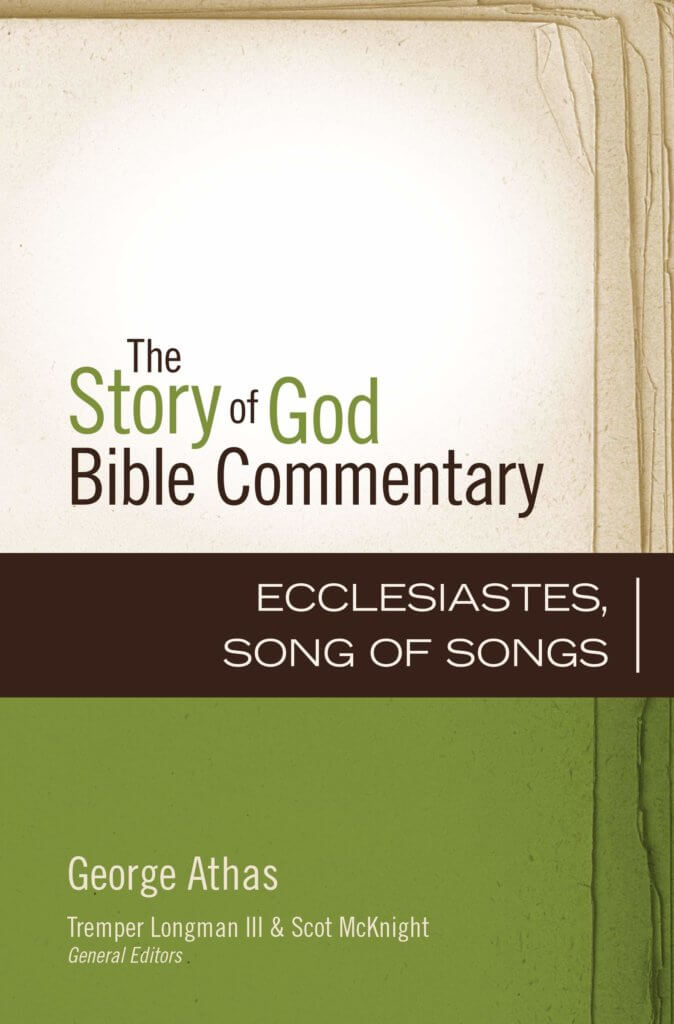George Athas. Ecclesiastes, Song of Songs. The Story of God Bible Commentary. Grand Rapids: Zondervan Academic, 2020. 400 pages. $39.99 (hardback).

The Story of God Bible Commentary Series seeks to provide commentaries that help readers grasp the ancient meaning of the biblical text and its continuing significance today (p. 13). Each section of the commentary consists of three parts: “Listen to the Story” (the text of the Biblical passage in the NIV translation), “Interpret the Story” (a study of the text’s original meaning), and “Live the Story” (suggestions on how to apply the text to one’s own life). George Athas, Director of Research and Senior Lecturer in Hebrew and Old Testament at Moore Theological College, contributes the most recent Old Testament entry in the series.
Athas places Ecclesiastes in the reign of Ptolemy III Euergetes (246–222 BC) and understands Qohelet (the implied author) as a sage. He thus concludes that Solomon is not the author but a persona used to present the author’s theater (pp. 22–23). Qohelet’s hopelessness (Hebrew hebel) comes from his view of death and the oppression of Israel in his Ptolemaic context. One of Qohelet’s chief purposes for writing is to reveal conventional wisdom’s limitations. According to Athas, Ecclesiastes is divided amongst two personas: Qohelet and the Epilogist or frame narrator (p. 39). The Epilogist agrees with Qohelet’s message but presents a more traditional mindset. He concludes Ecclesiastes with a call to orthodoxy and orthopraxy, not as a correction but as a cultivation of hope in Judaism’s survival (p. 235).
Athas argues that Song of Songs was written in 166 BC during the time of the Maccabean revolt and Antiochene persecution (p. 252). Its genre, he explains, is song filled with Hebrew poetry, but is to be read also as a narrative or drama with three main characters: a youthful woman, her male lover, and King Solomon (pp. 252–55, 257).
Athas’s emphasis on the 3rd and 2nd-century BC contexts may be a stumbling block to those who do not share his views on the books’ date and authorship and may cause readers to question their ability to understand the books apart from expert knowledge. Readers should be aware that Athas also sees a disconnect between the OT and the NT with regard to the teachings of Qohelet, who, he argues, has an incomplete knowledge of God and can hardly discern the difference between God’s and oppression’s power (pp. 114, 186). While Athas quickly points people to Jesus in the Live the Story sections, he does so from a perspective that views Qohelet as a source of instruction for Christians merely on what not to do. He also holds that Song features the inclusion of premarital sex, though he himself does not condone sexual relationships outside of marriage (pp. 334–37; 363–65). Nevertheless, Athas provides all readers, even those who disagree with him, with an earnest analysis of historically difficult texts through a commentary that is accessible and well organized.
CBS book notices provide brief descriptive summaries and assessments of new publications in biblical studies and biblical theology. CBS book notices are not full academic book reviews. The present book notice was written by Ross Harmon, a Ph.D. student at Midwestern Baptist Theological Seminary.



